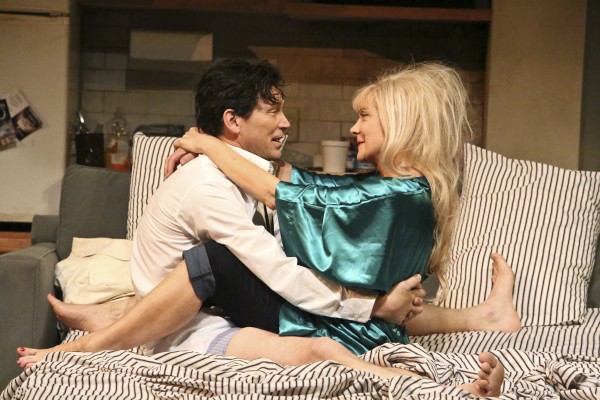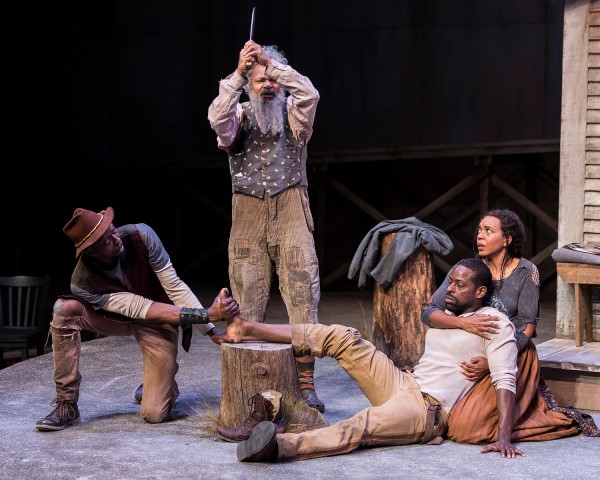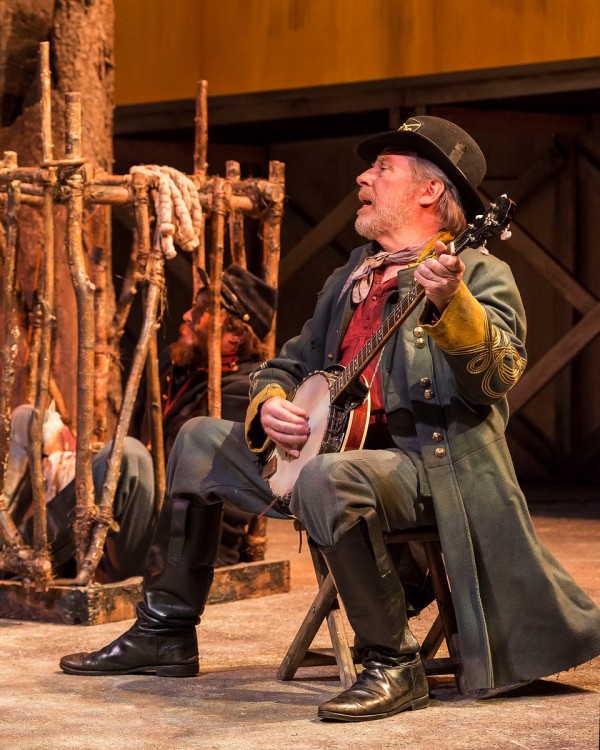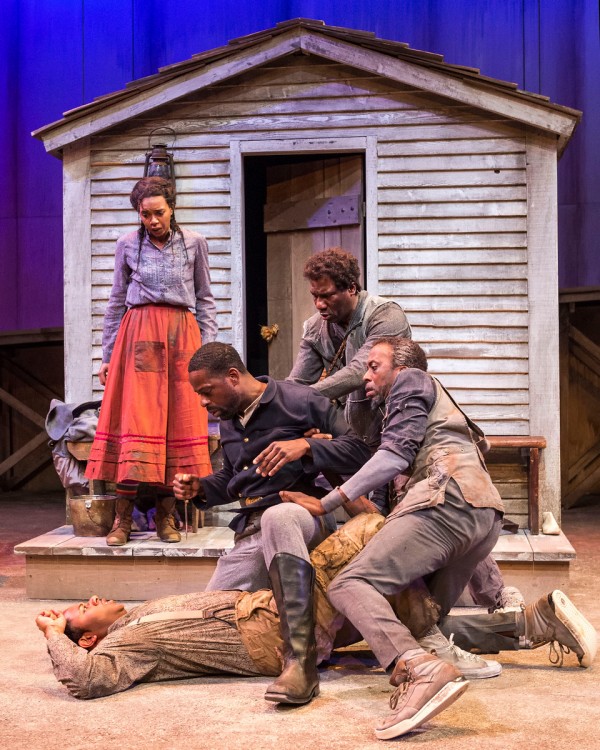My first encounter with playwright Sarah Ruhl’s work was with The Clean House, her piquant and roguishly skewed vision of an interior world that lingered with me long after the performance. I’ve not been able to repeat the experience since; the other plays of hers that I’ve seen (I’ve not seen all) never delivered quite as juicy a jolt.
I can say almost the same for the work of Suzan-Lori Parks, whose Topdog/Underdog made a deep impression, but whose subsequent forays have been dicier.
Yet Ruhl and Parks currently have plays on Los Angeles stages that are linked not by subject matter — one is a light comedy, the other a historical epic in the making — but by certain poetic aspects of the material and, simultaneously, the unfinished quality of the work. Even though neither play is new and the lengthy Parks three-parter promises more parts to come, both are recent works marked by a level of muddle and overindulgence. In Ruhl’s case, it’s a lingering curiosity to see how far she can go with a contrapuntal idea (not as far as she’d like); in Parks’ case, it’s an overflow of creativity in need of reining in by some rigorous editing.
Stage Kiss, Ruhl’s comedy at the Geffen, is an odd mix — part playful, part serious, but also strangely literal. Intended as a satire of the world of theatre and the people in it, it barely makes it as a comedy, with a halting first act that aims for funny, yet misses its timing and its mark. (Shades of George Kelly’s 1923 The Torchbearers, about hopeless amateurs bumbling through a rehearsal…)
Its central mechanism is that of former offstage lovers (actors known only as He and She) who, some 20 years after their affair, are cast in a play as onstage lovers. After the initial discomfort, they find themselves reverting on and off stage to being in love with each other all over again, even though He (Barry Del Sherman) is engaged to be married, and She (Glenne Headly) is married to a good man (a fine Stephen Caffrey) and has a feisty 16-year-old daughter (Emily James) with blue hair, a tattoo and a big mouth.
Silly, yes, but silliness never stood in the way of a good comedy — or satire. However, neither Ruhl nor director Bart DeLorenzo quite get the show off the ground in a stilted act one, and that is always a danger; it can invite walkouts at halftime, which would be too bad because the second act suddenly grows up with some revealing, wise and tender moments — even a few poetic ones, to remind us that Ruhl was a poet earlier in life.
In this second act, the couple is forced to contemplate LIFE in real terms — and LIFE bites back. The comedy to be found here is more rueful and genuine, as the play raises deeper issues of disillusionment, reflection and fulfillment, all of which have a firmer grip on our attention.
That said, Stage Kiss is still puff pastry and not one of Ruhl’s most seamless efforts. Since it is not a new play, it may be futile to add that it might be improved if cut by 20 minutes. But it suffers from production problems also. Headley and Del Sherman don’t make great music together. He seems bored or tired much of the time, She comes across too often as petulant, while Tim Bagley, as the mentally absent Director of the production-within-a-production, is perhaps a bit too passive as he lets his actors run amok, eager only to make sure that he gets to eat on time.
Mathew Scott Montgomery works hardest (and well) in a series of comic roles, and Melody Butiu is refreshingly assertive as He’s intended fiancée, while David Kay Mickelsen’s mock prostitute get-up for Headly in act two, almost steals the show.
The enthusiastic musical interludes of John Ballinger during scene changes try to rev up the action that the production doesn’t quite deliver, while Ruhl’s intuitively quirky voice, when it surfaces at all, gets zoned out by the play’s structural hiccups that even DeLorenzo’s capable directorial talent is unable to overcome.
This ephemeral piece is a far cry from the stratospheric ambitions of Suzan-Lori Parks’ Father Comes Home From the Wars, Parts 1, 2 & 3, receiving its West Coast premiere under the direction of Jo Bonney at The Mark Taper Forum downtown. Clocking in at a tad over three hours — about an hour per part — it is, at the moment, a muddled Civil War tale of freedoms desired, pursued and obtained in a series of chapters in the life of a black slave named Hero (a strong Sterling K. Brown) and his fellow slaves.
Parks insists she is not “retelling” Homer’s Odyssey, but it’s everywhere — from the slaves who act as a Greek chorus, to Hero’s wife Penny (as in Penelope, played by Sameerah Luqmaan-Harris), to his pal Homer (Larry Powell), to his dog Oddsee, even to Hero’s decision to follow his master, the Colonel, into battle and, finally, to his return from the war a changed man with a new wife and a new name: Ulysses, for the Civil War general, says Parks, not the historical King of Ithaca.
At this stage of development, Father Comes Home From the Wars does not earn its length and is riddled with holes that Parks might be planning to fill as she comes up with more “parts.” But still. In the current Part 2, focused on the Colonel’s cruelty and vainglorious rants on the Confederate side (a superbly sadistic Michael McKean), he orders Hero to light a fire and fix food that is never eaten but packed away, making the event an entirely pointless distraction.
The Colonel’s wounded Yankee prisoner, Smith (a persuasive Josh Wingate), kept in a narrow cage, looks white but reveals to Hero that he’s really black. It may be Parks’ way of addressing issues of blacks passing as whites, but currently the character is in a dramaturgical limbo, bearing very little connection to the rest of the play except as an orphaned footnote.
Similar broken synapses apply to the changes in Hero after his return from the war. Perhaps Parks intends to explain them later, but right now we only guess at why he’s different or what led to his acquiring a new wife (a woman we never meet and who, in this context, is a device to give Penny permission to abandon Hero/Ulysses and follow Homer, the man she’s learned to love and bed in Hero’s absence). While playwrights have the absolute prerogative of defining the inspiration for their titles, calling this work Father Comes Home from the Wars, is baffling since no one returning from this one is a father. Yet.
The one character in all this that could use a better introduction and must never change, is the vision-challenged Oddsee, Hero’s dog, played to a rollicking fare-thee-well by the admirable Patrena Murray. Not only does Oddsee provide welcome hilarity, but he is rich in underused possibilities and deserving of inclusion in Parts 1 and 2 as well as 3. As long we’re going there, why not imbue this creature with the perceptions of a soothsayer? He’s got the name and the semi-blindness for it.
A final word: the scenes begin and end with musical interludes, also composed and written by Parks, and performed with self-effacing grace by Steven Bargonetti. They are a fine form of punctuation.
As you can tell, there is work to be done and little doubt that Parks will do it, but for now be prepared for three hours of partial satisfaction. More to come.
Top image: Glenne Headly and Barry Del Sherman in Sarah Ruhl’s comedy, Stage Kiss, at TheGeffen Playhouse. Photo by Michael Lamont.
STAGE KISS at the Geffen Playhouse, 10886 Le Conte Avenue, Los Angeles, CA 90024. Plays Tuesdays-Fridays, 8pm; Saturdays, 3 & 8pm; Sundays 2 & 7pm, through May 15. Tickets, $46-$82 (subject to change), available online at www.geffenplayhouse.com or at 310.208.5454 or at the Geffen box office. Fees may apply.
FATHER COMES HOME FROM THE WARS, Parts 1, 2 & 3 at The Mark Taper Forum, Music Center, 135 No. Grand Avenue, Los Angeles, CA 90012. Plays Tuesdays-Fridays, 8pm; Saturdays 2:30 & 8pm; Sundays 1 & 6:30pm. No public performances April 26-28. Ends May 15. Tickets $25-$85 (subject to change), available at www.CenterTheatreGroup.com or at 213.628.2772 or at the CTG box office.
Sylvie Drake is a trilingual translator and writer, who was born in Alexandria, Egypt. She has an MFA in directing from the Pasadena Playhouse, is a former theatre critic and columnist for the Los Angeles Times, serving as chief critic for the last three of a total of 23 years. She was invited to establish Prima Facie, the first new play festival for the Denver Center Theatre Company that continues to this day under a different name, and later served for several years as director of Media Relations & Publications for The Denver Center for the Performing Arts as well as advisor to the Denver Center Theatre Company. She was twice president of the Los Angeles Drama Critics Circle, is a current member of the American Theatre Critics Association and a current contributor to mindev.culturaldaily.com and other publications.
